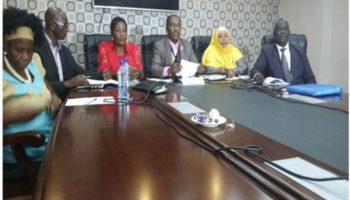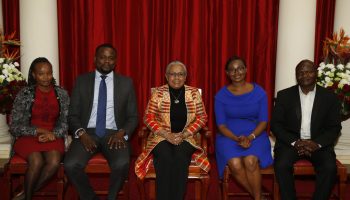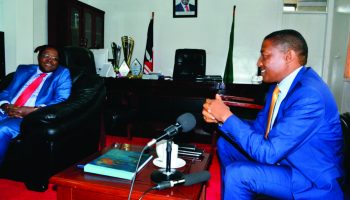- September 30, 2020
- Posted by: p mulee
- Category:
Kenya’s cash and jobs crisis has taken a turn for the worse following a government directive to freeze the hiring of new civil servants for three years.
“It is government policy to contain the wage bill to the medium-term targets,” Cabinet Secretary Ukur Yatani instructed accounting officers.
The National Treasury has directed all ministries, state departments and agencies (MDAs) not to allocate resources for new recruitment.
Also frozen are paid internship and staff upgrades.
In a circular to accounting officers, Yatani said only the most essential jobs will be budgeted for or advertised with prior express approval of the Treasury.
Budget allocations for 2021-22 to 2023 -24 will only allow for normal wage drift to cater for movement from one salary scale to another.
When hiring is critical, Yatani said MDAs must obtain a written approval from his office about the availability of funds.
Only after getting the go-ahead will state entities consult the Salaries and Remuneration Commission (SRC) to make the funding adjustments.
It remains unclear if retiring civil servants will be replaced.
Thirty-five per cent of national government employees are aged between 51 and 60 years, while 53 per cent are between 46 and 50 years.
The ages mean a large number of public servants is retiring annually.
The government is the biggest employer in Kenya and the cutback will greatly aggravate the employment crisis and could impede service delivery.
Apart from the job freeze, Yatani cited resource constraints and directed accounting officers to review their requirements for goods and services to reduce recurrent spending.
Requests for goods and services will have to be supported by agreements, demand notes and documentary evidence of past trends.
Further, Yatani said no new projects will be started without the express approval of the Executive Office of the President.
“In case of any new project, the sector working groups are advised to only consider those approved by the Executive Office of the President,” the circular to MDAs reads.
“MDAs will be required to ensure all new projects are adequately prepared, appraised and approved by the National Treasury before seeking approval from the President’s office,” the CS said.
Even so, tough conditions will be imposed on new projects that will be approved upon confirmation that land is available, affected persons compensated and public participation carried out.
Accounting officers will also be required to provide detailed designs, relevant approvals and resource requirements, including personnel.
Yatani directed the details of new projects be captured in the Public Investment Management Information System (PIMIS).
“Where the above preliminaries have not been met, accounting officers will only request resources to meet these prerequisites in that financial year,” he said.
Financial agreements with development partners will also be executed for projects approved and processed through the PIMIS.
“For any new project to be considered for funding, it must have been appraised and approved and pipelined by June 30 of the preceding financial year,” the CS said.
Ongoing and stalled projects will be prioritised in next year’s budget with priority for those that would facilitate the Post-Covid-19 Economic Stimulus Programme (PC-ESP) and the Big Four Agenda.
Accounting officers are also required to list details of ongoing projects: total cost, start and end dates, expenditure to date and balance to completion.
Resource allocation will depend on linkage of programmes to PC-ESP, the Big Four, Vision 2030 and the degree to which a programme creates jobs and alleviates poverty.
Also to be considered are the expected output and outcomes, cost-effectiveness, sustainability and implementation of the Constitution.
Yatani has restated all ICT services remain consolidated under the ICT ministry, including purchase of computers, printers and other equipment.
Networking services, purchase of software, ICT professional services, purchase of photocopiers and specialised equipment rest with the CS Joe Mucheru-led ministry.
MDAs have until November 27 to submit their budget proposals to the National Treasury. They must be aligned to achieving the Big Four and the Post-Covid-19 Economic Recovery Strategy.
President Uhuru Kenyatta and Deputy President William Ruto rode to power on the promise of 1.5 million jobs annually. The pledge has remained a mirage.
The Kenya National Bureau of Statistics recently revealed that 1.7 million citizens have have lost their jobs since March due to the adverse impact of the Covid-19 pandemic.
Jobs in the hospitality, travel, building and architecture industries were the worst hit due to containment measures including lockdowns, travel restrictions and a nationwide dusk-to-dawn curfew.
The Federation of Kenya Employers (FKE) last Friday projected Kenya will have lost more than a million formal jobs by December due to the pandemic.
FKE boss Jacqueline Mugo said Covid-19 wiped out 8.3 per cent of jobs in the private sector between March and July – 173,743 jobs.
She said the situation portends more trouble if nothing is done to reverse the trend. “This is a huge loss considering that for the last five years, only 218,000 jobs had been created in the sector.”
Mugo said that technically, Covid-19 has wiped out 80 per cent of all jobs created in the private sector since 2015.
President Uhuru Kenyatta on Monday reopened the economy to stem further job losses – which have reduced income tax collections.
He ordered bars opened, increased the number of people allowed to attend social gatherings and relaxed the nationwide curfew, pushed it back from 9pm to 11pm.
To cushion employers, the President retained the corporation tax at 25 per cent until January 1, 2021, while MSMEs will continue enjoying 1 per cent turnover tax.
















